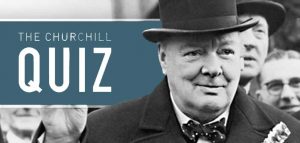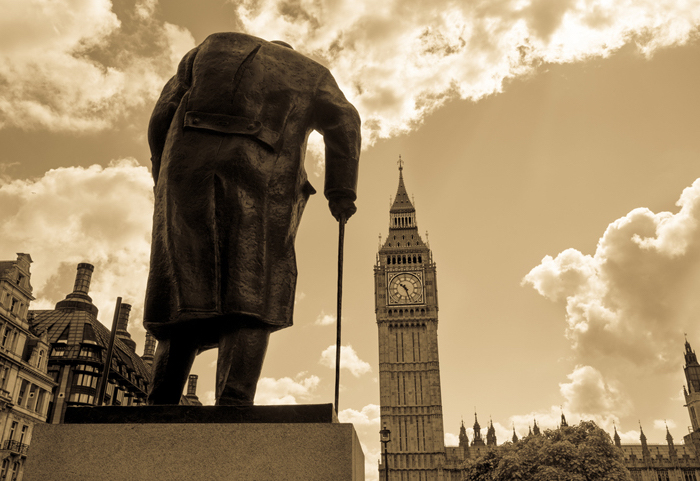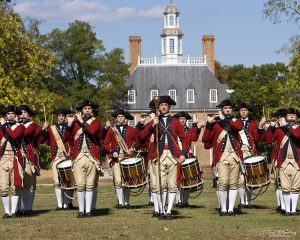
Bulletin #117 - Mar 2018
An Affair Not to Remember

In Parliament Square, Churchill turns his back on a scurrilous accusation.
March 14, 2018
By MICHAEL F. BISHOP and DAVID FREEMAN
“CHURCHILL’S SECRET AFFAIR,” scream the headlines. Evidently, we are to believe that the happily-married Winston Churchill had a dalliance with the glamorous, doomed socialite Lady Castlerosse in the 1930s. An allegation based on a rumor of a supposed marital indiscretion eighty years ago hardly seems like news, but media around the world have breathlessly reported it as indisputable fact. It appears, however, that journalists have not taken the trouble to read and carefully analyze the article published this month in the Journal of Contemporary History that gives rise to this sensationalist storm.
Even a cursory reading of the article by Richard Toye and Warren Dockter (history professors who have both written for and spoken to meetings of the International Churchill Society) makes clear that there is no evidence for the allegation save for the suspect reminiscences of Sir John “Jock” Colville, Churchill’s wartime private secretary, who entered the Prime Minister’s service several years after the purported liaison.
Colville’s diary from the time he did work for Churchill is an extremely important primary source, but his claim about knowledge of an affair Churchill supposedly had in the mid-1930s rests on an interview that Colville gave in the mid-1980s and is itself based on a highly dubious event he claims to have witnessed in the mid-1950s.
Colville made his statement on tape to Dr. Correlli Barnett, then Keeper of the Churchill Archives, in 1985. Barnett was asking Colville’s advice about whom the archives might interview for the historical record. Most of the conversation is uneventful until the name of one of Churchill’s former research assistants, Denis Kelly, is mentioned.

2024 International Churchill Conference
Colville suddenly springs to life saying that Kelly “had done a terrible thing” and then revealed “a scandalous story” that could not be told “for a great many years” about “some love letters” in Churchill’s papers from Lady Castlerosse. Colville goes on to state:
“I was having tea with Winston and Clemmie Churchill at Chartwell and Denis Kelly suddenly emerged and said, ‘I wonder who all these letters are from?’ and handed them to Mrs. Churchill, who read them and went white….And it worried her terribly for long…months afterwards. And she used to say to me, ‘I never thought Winston had ever been unfaithful to me.’ I’d say, ‘Well, I bet he wasn’t. I mean really, it was, just you know, a little fling in the south of France.’ I said, ‘There are lots of otherwise respectable husbands, who on a summer’s evening might be naughty….You really shouldn’t worry about it,’ but she did. She got awfully worried about it, and it’s all to do with that fool Denis Kelly who showed her the letters.”
At best, Colville was claiming two years before he died to have second-hand knowledge of a fifty-year-old event that took place before he ever met the Churchills. After exploring circumstantial evidence from the time of the alleged affair (details picked apart by historian Andrew Roberts in a blog post for the Spectator), Toye and Dockter concede that the allegation cannot be proven. But they do not say so explicitly instead choosing to put it this way:
“The contemporary evidence lends the story credibility, but perhaps the most that can be said is that Colville believed it and that—as one of Churchill’s most trusted aides for key periods in the 1940s and 1950s—he would not have made the allegation lightly.”
But can we really believe that?
The key problem with the Toye/Dockter presentation of the Colville tape is methodological. It does not consider the reliability of Colville’s memory or possible motivations for why he would make such a claim. Can anyone really believe that Kelly would be so crass as to bring directly to Mrs. Churchill a cache of old letters reputedly from her husband’s mistress and ask her what to make of them while her husband was sitting next to her having tea?
Unraveling this mystery requires some knowledge of Jock Coville. He was well known for making waspish statements in public, private, and print about people he did not like, including Denis Kelly. In fact, the only thing the tape really proves is that Colville disliked Kelly, but that was no secret.
We cannot prove it, but it can plausibly be surmised that Colville wanted to discourage others from interviewing Kelly and so either invented a story or exaggerated an old memory to achieve this end. He then insisted that the story could not be told for many years simply because he did not want Kelly to know that he (Colville) had been trashing him or telling a tall tale.
Toye and Dockter do not consider this or any other possible scenario nor do they report if they tried to learn whether or not Kelly—who outlived Colville—was ever given the opportunity to defend himself against the allegation.
As for the lady in question, Doris Delevingne was born in modest circumstances but used her looks and charm to vault her way into high society, claiming a title by marrying the dissolute and impecunious heir to an Irish earldom. Their marriage was marked by abuse and adultery.
Winston and Clementine Churchill had a long and loving marriage of nearly six decades that nourished and sustained him throughout his life. He was devoted to her and she to him. He was captivated by her beauty and relied upon her advice and often-superior judgment. Together they had five children and were united in searing grief by the death of their two-year-old daughter Marigold in 1921.
Clementine’s love sustained Churchill to the end. At the age of eighty-eight, less than two years before his death, he wrote to her: “My darling One, This is only to give you my fondest love and kisses a hundred times repeated. I am a pretty dull & paltry scribbler; but my stick as I write carries my heart along with it. Yours ever & always, W.”
Instead of taking the high road of responsible scholarship, Toye and Dockter make much of the fact that during a wartime visit to Washington, Churchill intervened to secure Lady Castlerosse passage back to England from New York—where she was living in 1942—but the idea that this represented an attempt to keep her quiet is hardly convincing. She could have told her story to the press regardless of her address. As it happened, she ended her life with an overdose of sleeping pills shortly after her return home.
One cannot prove a negative, and the recesses of the human heart are the most mysterious of places. The flimsy evidence for this recycled gossip, however, makes it unworthy of serious consideration. The authors present this story, nevertheless, in the context of a scholarly article that they represent to be primarily about the manner in which the historical record is curated.
Now, Toye and Dockter would have to be very naïve not to understand that it would only be the allegation of the affair that would interest the media. That they are not naïve about this is proven by the fact that they agreed to participate in a television documentary focusing only on the affair and which was broadcast in Britain on the same day as the Oscar ceremony in Hollywood. The program made a hash of the facts and presented no additional evidence.
Clearly the timing of this story was determined by a desire to capitalize on the renewed interest in Churchill sparked by the Academy Award-nominated film Darkest Hour, for which Gary Oldman justly received the Oscar for Best Actor. But Darkest Hour is a heroic portrayal of a great man, while this sordid tale is nothing but an unfounded assault on his memory.
Michael F. Bishop is director of the National Churchill Library and Center and executive director of the International Churchill Society.
David Freeman is director of publications for the International Churchill Society and teaches history at California State University, Fullerton.
Subscribe
WANT MORE?
Get the Churchill Bulletin delivered to your inbox once a month.




